Photo blog: Ethiopia's leaders in health
Dominic Chavez is a Boston-based free-lance photographer who specializes in global health coverage. In the last 18 months, the Ministerial Leadership Initiative has supported Chavez and writer John Donnelly's travel to all five countries that work with MLI: Ethiopia, Mali, Nepal, Senegal, and Sierra Leone. In this fifth of five segments, one from each country, Donnelly interviewed Chavez about his work and about the images below. What follows are his perspectives on his assignment in Ethiopia, which focused on the Federal Ministry of Health and its efforts to bolster community-based health care.
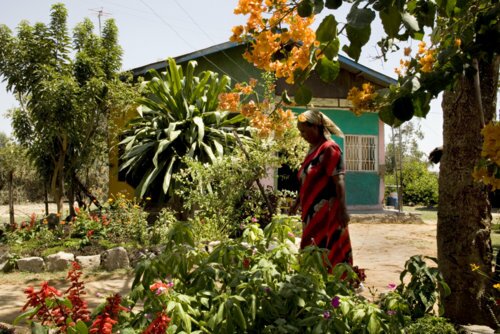 In the village of Shera Dibandiban, about 50 miles southeast of Addis Ababa, the capital, Lomi Desse, 38, tends to her garden. She has helped the health extension workers teach others to live healthier lives by installing proper latrines and running water as well as eating more nutritious foods |
“In a way, I was taken aback by how well off this woman was. She was kind of living the African dream. She had running water, she had an awesome house, she had an amazing walk-through, front-yard garden with flowers, and trees that were filled with flowers. She had a big piece of property to grow her own food. She was totally self-sustained. The health extension workers educated her and gave her guidance on having running water, a good toilet, and eating well, and she is going to have a happy, healthy, productive life. She is going to be alright. She was one of the wealthiest people I’ve ever met. I don’t mean wealthy as in material things, but as in happy, healthy, a good home, a place she can produce her own food and sell food. She wasn’t dependent on an NGO, she wasn’t dependent on a government, she was totally self sustained.”
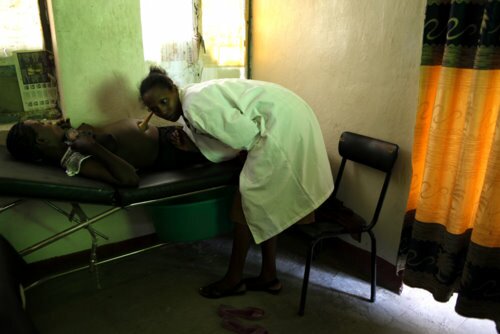 Health extension worker Lomita Bekele uses simple technology to listen to the heartbeat of a fetus during a checkup of Medhanil Legesse, who was eight months into her pregnancy, in the village of Shera Dibandiban. |
“We’re at a small clinic, a health post, in the middle of nowhere, and this just kind of shows how bare-bones the resources are. But it also shows a well-trained staff, and the good common sense for a pregnant mother to get checked out, to see if everything is on track. It seemed like kind of an ideal health post. There were two staff members, they had a computer, they seemed to have a good supply of medication, so it was nice to visit it and see the staff taking care of people.”
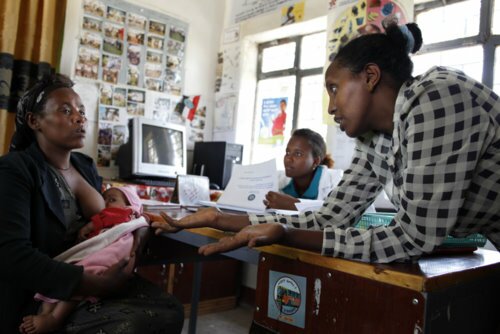 Health extension worker Lomita Bekele talks to Medhanil Legesse during an ante-natal care checkup. |
“This is the same health extension worker, and she was quite impressive. What I liked most about her was her ability to connect with not only her patients, but her ability to explain and show us her role and her responsibility. In the picture, you get a sense of her explaining something and a sense of the connection between her and the patient. What I like about the photograph is she is reaching out to her and that creates a dialogue between the two.”
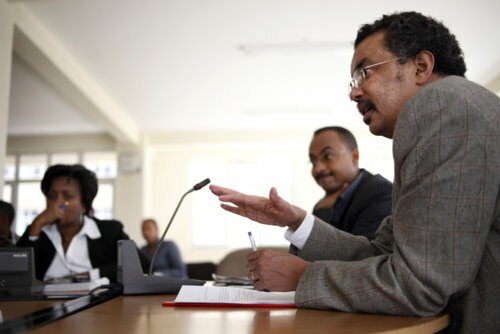 Ethiopia’s Health Minister Tedros Adhanom Ghebreyesus in a meeting with his top staff at the Federal Ministry of Health in Addis Ababa. |
“He’s kind of an interesting guy. It’s like he has a responsibility for empowering his staff as well as influencing people of power. In this picture, it’s like you get a sense of him in one of these marathon meetings that just won’t end. You know that these intense conversations have such a big effect on the average Ethiopian. What happens in this meetings will change important parts of how the health system runs, so there’s a tremendous amount of pressure on this ring of leaders in that room.”
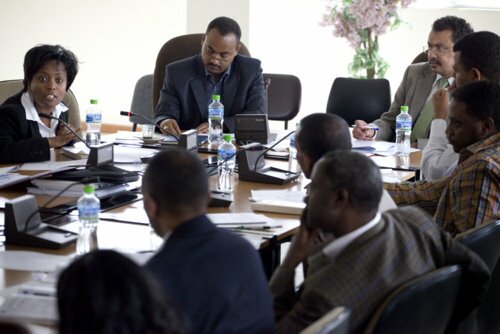 Roman Tesfay, Director General of the Policy, Planning and Finance General Directorate at Ethiopia’s Federal Ministry of Health, makes a point during a Ministry meeting in Addis Ababa. |
“She is surrounded by men mostly, but to her it’s not a gender thing; she's leading. It’s a nice complementary light on her and it shows her in the middle of her daily job. You can’t help but like her, or like these other people around the table. They are the real thing. It’s not a movie. It’s real life. They have long prepared for these days that they are living and working now. They have spent a lifetime preparing to do what they are doing. You can’t help but want to see who they really are.”
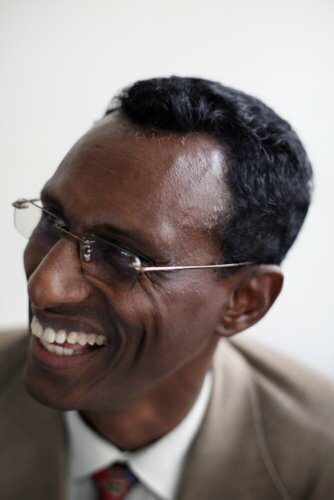 Ato Fikru Tessema of the Health Sector Reform Directorate in the Federal Ministry of Health in Ethiopia. |
“This is just like a kind of a solid picture, not really a portrait, that portrays his enthusiasm for his work. He has a good energy, a good personality, and he seemed to take his work very seriously. I just wanted to photograph him closer and closer, so eventually it became more of a head shot, and it was a vertical and I almost never shoot verticals. I was drawn in closer to him because of his personality and the light on his face.”
Other Photo Blogs:
Keyword Search
MLI works with ministries of health to advance country ownership and leadership. This blog covers issues affecting the ministries and the people they serve.
Connect with Us
![]()
![]()
Categories
Blogs We Like
- Africa Can End Poverty
- Africa Governance Initiative
- Behind the Numbers
- CapacityPlus
- Center for Global Health R&D Policy Assessment
- Center for Global Development: Global Health Policy
- Center for Health Market Innovations
- Global Health
- Global Health Hub
- Global Health Impact
- The New Security Beat
- PAI Blog
- RH Reality Check
- Save the Children
- Transparency and Accountability Program
Contact Us
Please direct all inquiries to
